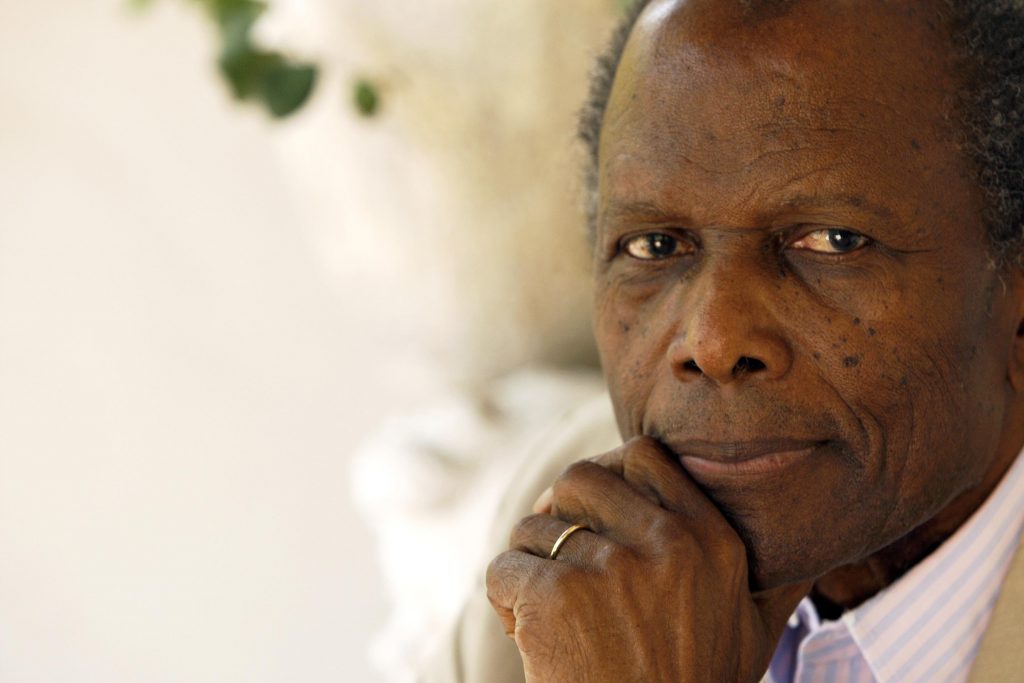Sidney Poitier: A Legacy of Courage and Grace
Daniel Humphrey from the Department of Performance Studies discusses the life and legacy of one of America's greatest actors: Sidney Poitier.

Sidney Poitier, a groundbreaking actor and the first African American to win the Academy Award for Best Actor in 1963, passed away on Jan. 6. His breakthrough performance in The Defiant Ones (1958) began a long and storied career spanning six decades and countless unforgettable performances.
The College of Liberal Arts spoke with Daniel Humphrey, the associate head and film studies coordinator of the Department of Performance Studies, about Poitier’s career, activism, and the legacy he leaves behind. The following Q&A, which has been condensed and edited for clarity, provides a small window into the importance of Poitier’s contributions to society.
How did Poitier’s career as an actor and a director open the door to a new generation of Black actors?
Poitier was first and foremost an actor whose name on a marquee sold tickets. In the 1960s he was regularly among the top ten stars in terms of box office revenue, coming in at number one on the list in 1968. He was widely respected for his skill as an actor and admired for the magnetism he exuded on screen. Poitier walked a rather precarious tightrope during the civil rights era, as someone whose success required he appear non-threatening to sometimes unconsciously racist white audiences while also serving as a self-respecting hero to Black audiences.
While he was criticized by many in the African American community, particularly those gravitating toward the Black Power movement, for not exploring sharply political issues in his work, in retrospect, he is recognized as a trailblazer who offered a complex, if perhaps incomplete, image of Black manhood. Even people, like James Baldwin, who would criticize the films Poitier appeared in, had great respect for him as an individual, an actor, and a screen presence.
What is the significance of Poitier winning the Academy Award in 1963 for the film Lilies of the Field?
Back when winning an Academy Award actually meant something—the ratings for the show was comparable to the Super Bowl–Poitier’s win was widely seen as an inspirational breakthrough. The film he won for, one of many in which he played a character whose primary function was to help white people, may not have dated particularly well, but one cannot overestimate the symbolic value of him taking the stage at the Oscars to claim the film world’s highest honor.
How did Poitier’s roles reflect the peaceful integrationist goals of the civil rights movement?
Poitier was generally cast as an assimilationist at a time when many blacks were questioning assimilationist politics via leaders like Malcolm X and the Black Panthers. The playwright Clifford Mason argued that most of his roles were “demeaning” in a widely read New York Times article first published in 1967. However, the anger he expressed in some films, like when he instinctively slaps a white bigot who had just slapped him in In the Heat of the Night, indicated that he was not someone to suffer injustice gladly and those flashes of anger may well have been the limit of what mainstream, white American culture could handle at that time.
When he had enough power, he wrote the treatment for a romantic comedy, For Love of Ivy, which implicitly addressed some of the criticism he had faced by Mason and others. In the film, instead of helping white people with their problems for two hours, he comes to the aid of a Black woman suffering from the condescension of a liberal white family that has been trying to keep her in their infantilizing employ as a maid. It was the first African American romantic comedy and it holds up extremely well today. My students love it when I show it in classes.
When you think of Sidney Poitier, which of the characters he played comes to mind first?
As a child, it seems like To Sir, With Love was always on TV…I think a lot of people of all races gained a desire to be a teacher at some level after seeing him make the profession seem so heroic and meaningful in that film.
Former President Obama awarded Poitier the Presidential Medal of Freedom citing his “relentless devotion to breaking down barriers.” What does this say about Poitier as a civil right activist and pioneer in his field?
Along with Harry Belafonte, Ruby Dee, and many others, Poitier worked within the system to ease racial tensions and he epitomized Black, male human dignity for a generation, off-screen if not always on-screen. If most of his films were less than radical in their portrayals of racial injustice in the United States, Poitier was an active member in the Civil Rights movement at the height of his fame, and a very effective one, too.
In your opinion, what legacy does Poitier leave behind?
Poitier was in the unenviable position of being expected to please both white and Black audiences in a fraught political landscape in a very difficult period in American history. In hindsight, however, it’s hard to imagine anyone convincingly arguing that he was anything other than a positive influence in American culture, and someone, who, even if few of his films are towering classics, certainly gave many classic performances. He always exemplified courage and grace.
